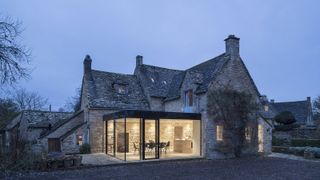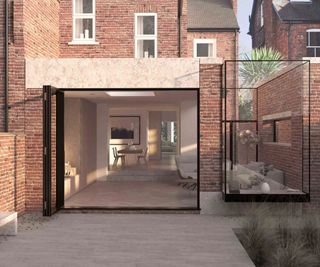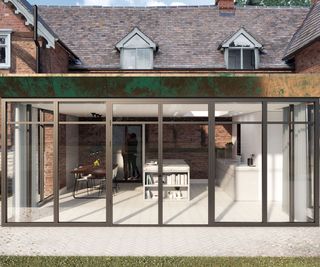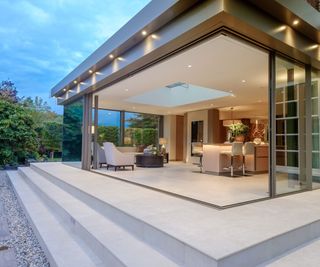What is a glass box extension and is one a good idea for your build?
There is no doubt that glass box extensions can make stunning additions to all kinds of homes, both old and new. Here we explain everything you need to know, from design options to costs

Adding a well-designed glass box extension to a house is a surefire way to ensure your new addition makes a big statement, yet they are also perfect for those who want to extend a period property in a way that doesn't detract from the original building.
That said, there are some serious design considerations to bear in mind if you are thinking of building an extension made wholly from glass – including the issue of overheating. There is also the not so insignificant matter of costs to think about – this is certainly not the cheapest way to add space to a house.
In this guide, we have asked the experts for their thoughts on the pros and cons of glass box extensions and, should this be a route you are determined to take, how to ensure the project is a success.
What is a glass box extension?
There are many different design options when it comes to glass extension ideas – but what they all have in common is that they are constructed predominantly from, you guessed it, glass.
"The design options for a glass box extension are endless," says Rebecca Clayton from IQ Glass. "From a full glass box with clear glass on all sides, to the introduction of solid elements, like a solid roof, a glass extension can be designed to suit your space.
"Unlike a conservatory, a glass room aims to create a smooth transition to the outside with full glazing, providing unobstructed views," continues Rebecca. "Where conservatories have large clunky frames, a glass room is made of frameless glass panels, offering a clean minimal look with more light and visibility. Depending on the design, some glass extensions have sliding glass doors or bi folding doors that open completely."

Rebecca Clayton is communications director at IQ Glass. She has many years of experience with the company, who specialise in architectural glazing and installs some of the most pioneering architectural glass technology available today.
Frameless vs framed glass box extensions
While many people picture glass box extensions as being completely frameless, there are other options which, in some cases, can work better.
Architect Jason Laity is director of Unity Architects Limited and explains how different systems worked better for two glass extension projects he has worked on recently.
"The glazing strategies between the examples shown here are slightly different. One is a frameless glazed solution and one is a framed glazed solution. Both benefit from high quantities of glass. Decision making on the systems can come down to cost, robustness, visibility and the requirement for an aesthetic rhythm."



During his architectural career, Jason Laity has enjoyed working on both national and international works of significance and introduces a design-led approach to all projects undertaken by Unity Architects.
His RIBA certified qualifications in the field include a First Class Degree in Architecture and a Diploma in Architecture with Distinction. Jason is a registered architect with the Architects Registration Board (ARB) and is a Chartered Member of the Royal Institute of British Architects (RIBA).
Do glass box extensions suit period properties?
Despite glass box extensions usually being thought of as only suitable for those after modern extension ideas, they actually work brilliantly as additions to older-style properties too.
"Although a glass box is seen as a futuristic addition to a building, these types of clear extensions suit traditional builds as much as a contemporary new home," confirms Rebecca Clayton.
"Due to the inherent appearance of glass – it is clear – it allows you to see the traditional build behind and there is a clear difference between what is new and what is old," continues Rebecca. "These types of frameless glass extensions can sometimes appease planning officers that don’t want to disrupt the integrity of the building's original architecture."
"Glass extensions are common introductions upon conservation and heritage schemes," says Jason Laity. "This project typology frequently demands a light-touch approach. A glass extension can offer a sensitive development strategy and support the harmony between old and modern materials."
Do glass box extensions overheat?
One of the most common worries held by homeowners considering adding any kind of heavily-glazed extension to their home, be that an ultra-modern glass box or a more traditional conservatory, is that it will become unbearably hot in summer – so is this likely to be an issue you should be concerned about?
"General considerations relating to glass extensions include thermal performance, with the potential for overheating during summer months as a consequence of intense solar gains," explains Jason Laity. "Equally, a glass extension may not perform so well in winter months, when compared with a highly-insulated façade."
So how can extension overheating be avoided?
"The internal function of a glass extension in relation to sun angle and orientation is important," advises Jason.
"Solar control coatings are also popular for these types of highly glazed environments to reduce the amount of solar radiation travelling through the glass to reduce solar gain," explains Rebecca Clayton.
What type of glazing is best for glass extensions?
The type of glazing you choose for your glass box extension is hugely important in terms of both how well it performs as well as the amount of maintenance you will need to carry out to keep it looking its best.
"Heated glass can provide the sole heat source for the extension space, solar control glass and coatings can provide effective solar protection and low maintenance coatings help reduce maintenance and cleaning on these large frameless glass structures," explains Rebecca Clayton.

How much do glass box extensions cost?
Not many people asking how much does an extension cost and looking at how to extend on a budget will be considering a glass box – and for good reason.
"It will come as no surprise that cost is a significant factor when considering a glass box extension," says Jason Laity. "If you are certain that you want to include high quantities of glazing in your project, make this clear to your architect from the beginning of the design journey and ensure you have good cost management through the design development stages, so that you can track the impact of such a costly material."
It is really hard to put an exact price on any kind of glass extension as they are bespoke structures and each requires different types of engineering which will influence what they cost. Everything from access to the type of glass used will have an impact.
IQ Glass say that, as a rough guide, you could expect costs of approximately £1,000/m2 for structural glazing and sliding glass door systems.
FAQs
How do you clean a glass box extension?
While a sparkling and sleek glass box extension can be strikingly beautiful, there are certain maintenance jobs that go hand-in-hand with this style of addition.
"A cleaning, access and maintenance strategy should be considered, as glass is a material that requires ongoing attention in order to be visually impressive," explains Jason Laity. "The inadvertent attraction and collection of flies and insects should also be considered. It is usually an afterthought but you may want to design openings to allow flies and insects to escape."
"All IQ Glass structural glass installations are designed to take a standard maintenance load," says Rebecca Clayton. "The strength of the glass used and the supporting methods of the structural glass ensure that all installations are able to take the load of a human in order to allow general maintenance and cleaning."
Do glass box extensions need planning permission?
Just as with any kind of extension, there will be cases where planning permission might not be required – instead the extension can be built under permitted development if it won't exceed specific parameters. Even if you feel certain that your extension will fall within your permitted development rights, you should still check with your local planning department to be on the safe side.
In addition, if you are extending a listed building, live in a Conservation Area or an Area of Natural Beauty you will almost certainly require listed building consent or planning permission.
While glass box extensions are a brilliant option for all kinds of properties, their cost and structural implications can be off-putting for some homeowners. If you like the idea of something a little more traditional, why not consider oak frame extensions as an alternative?
Get the Homebuilding & Renovating Newsletter
Bring your dream home to life with expert advice, how to guides and design inspiration. Sign up for our newsletter and get two free tickets to a Homebuilding & Renovating Show near you.
Natasha is Homebuilding & Renovating’s Associate Content Editor and has been a member of the team for over two decades. An experienced journalist and renovation expert, she has written for a number of homes titles. Over the years Natasha has renovated and carried out a side extension to a Victorian terrace. She is currently living in the rural Edwardian cottage she renovated and extended on a largely DIY basis, living on site for the duration of the project. She is now looking for her next project — something which is proving far harder than she thought it would be.